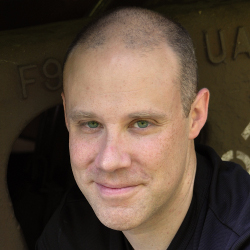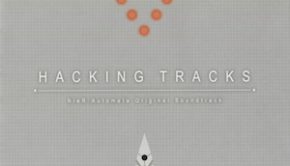Alexander Brandon Profile
 |
Also Known As: Siren / Sandman / Chromatic Dragon |
| Date of Birth: September 29, 1974 (Cleveland, Ohio) |
|
| Residence: Georgetown, Texas |
|
| Game Works: Tyrian, Unreal, Deus Ex, Alpha Protocol, Dust |
|
| Official Site: Company Site |
History
| Organisation | Type | Tenure | Role |
| Straylight Productions | Music Production | 1995 – 2000 | Co-Founder, Sound Producer, Composer, Sound Designer |
| Interactive Audio Special Interest Group | Educational Organisation | 1998 – 2004 | Steering Committee Member, Newsletter Editor, Website Designer |
| Ion Storm Austin | Game Developer | 2000 – 2003 | Audio Director, Composer, Sound Designer, Voice Actor |
| Midway Studios – San Diego | Game Developer | 2004 – 2005 | Audio Director, Composer, Sound Designer, Voice Actor |
| Midway Home Entertainment | Game Publisher | 2005 – 2007 | Audio Director, Voice Actor |
| Obsidian Entertainment | Game Developer | 2007 – 2009 | Audio Director, Composer, Sound Designer, Voice Actor |
| Heatwave Interactive | Game Developer | 2009 – 2010 | Audio Director, Creative Director, Project Manager, Graphic Designer |
| Funky Rustic | Music Production | 2010 – | Founder, President, Creative Director, Composer, Sound Designer, Voice Actor |
| Game Audio Network Guild | Educational Organisation | 2012 – | Vice-President |
Body
Over the last 20 years, the multi-talented Alexander Brandon has juggled roles as a sound director, musician, voice actor, and designer on titles such as Unreal, Deus Ex, and Alpha Protocol. Born on September 29, 1974 in Cleveland, Ohio, Brandon was surrounded by music and technology while growing up. Coming from a classical background, he received piano lessons from the age of eight, sung in his church’s choir, and learned some classical music theory. Pursuing choral music into college and high school, the singer even received the opportunity to perform under the baton of John Rutter at Carnegie Hall. But computers rather than choruses were what ultimately inspired him to start composing. After receiving an AdLib Music Synthesizer Card for Christmas in 1987 – the first commercially available PC soundcard – a thirteen-year-old Brandon started composing “like mad on it”. Over the subsequent few years, he composed close to 100 songs using the FM synthesizer in a wide range of styles. Also an avid gamer since the days of the Atari 2600, Brandon played numerous arcade, console, and personal computer classics. The music for titles such as Strider, Metroid, and Wing Commander greatly inspired him; he would record their soundtracks using a micro-cassette recorder and listen to them for hours. Even now, he maintains a “VGM Greatest Hits” Excel spreadsheet with close to a thousand entries.
In the early 90s, Brandon switched to creating tracker music using the Amiga. Introduced to the computer while at boarding school, the initially-sceptical AdLib fanatic was won over when he heard David Whittaker’s astounding music for Shadow of the Beast. The artist soon started to write tunes on his classmate’s computer and later plucked up the courage to join the demoscene and tracker communities. Despite arriving relatively late to the community, he impressed listeners when he released his first track – the technologically-commanded, musically-rich progressive rock spectacle “A New Dream” – under the name Chromatic Dragon in 1994. Over the subsequent few years, Brandon created numerous pieces in MOD (Ultimate Soundtracker), S3M (Screamer Tracker), and IT (Impulse Tracker) formats under the nicknames Siren and Sandman. His music spanned numerous genres and moods, including classical, techno, and rock music; this reflected his eclectic musical tastes, with his favourites spanning from Bach to John Williams, from Journey to Orbital. Participating in Bass Productions’ Face of the Dragon musicdisk and Kosmic Free Music Foundation’s eclectic projects, Brandon met numerous American and European demoscene designers and musicians during this time. Some of them, such as Andrew Sega, Dan Gardopée, Bryan Rudge, and Peter Hajba, went on to become lifelong collaborators.
While working in the demoscene, Brandon also received the opportunity to enter the commercial games industry at the age of just 19. His oldest friend Jason Emery asked if he could help him design a PC game using the sophisticated background engine that he developed. After initially attempting an adventure game, the duo ended up designing the futuristic arcade-style shmup Tyrian together. In addition to co-designing the concept and stages of the game, Brandon created an intense and memorable soundtrack using tracker software. Also in charge of managing and pitching the project, Brandon successfully signed the shmup to Epic MegaGames after capturing Cliff Bleszinski’s imagination. The title was released in 1995 to strong sales, rave reviews, and, to the pleasant surprise of Brandon and Emery, even some award nominations. The artist gained further understanding of integrating video game audio while working on Extreme Pinball, also published by Epic MegaGames; contributing to the music, sound, and voiceovers of this title, he put himself in a strong position to take sound direction roles on subsequent projects. Together with Emery, he also spent over a year designing an ambitious multiplayer RPG The Circle that sadly ended up being too big for them to complete.
In June 1995, Brandon established the music production company Straylight Productions with fellow demosceners Dan Gardopée and Andrew Sega. Over the subsequent five years, the company developed a strong industry reputation and huge fanbase through their work on franchises such as Unreal, Deus Ex, Vigilante 8, and, independently of Brandon, Crusaders. Brandon was initially recruited to write the music for two major projects at Epic MegaGames, Unreal and Jazz Jackrabbit 2. Unreal set the precedent for many first-person shooters with its excellent story-led presentation and ground-breaking engine. Together with Michiel van der Bos, Brandon immersed players into the game’s futuristic world by creating moody electronic soundscapes and a suspenseful cinematic overture. In one of the most sophisticated examples of a dynamic music system at that point, the music shifted depending on intensity of the action. The music proved so popular that Epic Games even prepared a commercial album release. Less pioneering but equally loved, Jazz Jackrabbit 2 was a 2D platformer revolving around the titular mascot. Perhaps inspired by his favourite Sonic and Mario scores, Brandon wrote a colourful soundtrack for the game filled with funk stylings and poppy melodies. In other roles at Straylight Productions, Brandon contributed to Dark Vengeance and Pretzel Pete, before porting the music for the vehicular combat titles Vigilante 8 and Vigilante 8: 2nd Offense using the Nintendo 64’s sound driver.
Despite primarily being known for his audio work, Brandon also continued to work as a wider game designer too. He served as the project leader for Tyrian 2000, a definitive update of the original game featuring additional stages and other polishes; those who register to GOG.com can download the game and its soundtrack for free at any time. The artist also started designing a third game in the Jazz Jackrabbit series, which was cancelled due to an unfavourable economic climate; the thirty minutes of music he created for the title has since been released by the Retro Game Music Bundle. At one point, Brandon considered switching his professional focus entirely to game design and was even interviewed for a post at Ion Storm. Nevertheless, he continued to reflect his lifelong passion for music in his spare time. In 1999 and 2000, Brandon co-wrote a series of five ambient original albums with Dan Gardopée and George Sanger; released under the AtmosphereS series, these albums explored moods, pulses, cultures, rhythms, and dreams. Beyond these commercial productions, Brandon also continued to pen plenty of new tracks for the demoscene. Together with Bryan Rudge, he pushed technological boundaries with the highly-acclaimed Oracle musicdisks. He also penned special tracks for international collaborations, such as the musicdisk The Return to Stage Nine and the compact disc audiophonik. But with trackers becoming outdated and the demoscene community dwindling, Brandon retired “Siren” at the end of the century.
In 1999, Brandon delighted his newfound fanbase with the soundtrack for Unreal Tournament. Under the direction of Cliff Bleszinski, Brandon and van den Bos adopted a harder-edged, faster-paced approach for this multiplayer spinoff; hard techno and heavy metal were particular influences for the Deathmatches. As with Unreal, all music was primarily composed using the Impulse Tracker and custom samples built with Sound Forge. Brandon concluded his time at Straylight Productions as the lead composer of Ion Storm’s Deus Ex. Blending orchestral sci-fi anthems with moody electronic fusions, the music fully captured the cyberpunk image of the game. Placing an emphasis on adaptive audio, Brandon ensured the gameplay music shifted between ambient and action depending on whether enemies were present. Still relying on his trusty tracker, the technical mastermind managed to achieve all this while compressing sixty minutes of complex adaptive music into just two megabytes of MOD files. The entire score was composed in just four months. Having impressed director Warren Spector with his work, he was subsequently offered the role of audio director at Ion Storm Austin. It was a big decision for Brandon, as it meant leaving behind Straylight Productions and passing on the much-anticipated project that he had started consulting on, Unreal II. However, the opportunity to score a sequel for Deus Ex was too much for Brandon let go.
Starting work at Ion Storm Austin in May 2000, Brandon was initially charged with building an entire audio studio from the ground-up. As audio director for the sequel Deus Ex: Invisible War, Brandon managed all music, sound, and voice assets on the title. Together with Brian Sharp, Brandon built a sophisticated Havok-driven audio physics system to ensure the audio suitably changed depending on character conversations and gameplay triggers. As the design lead favoured the audio of Thief over Deus Ex, the soundtrack generally departed from the thematic approach of the original in favour of ambient and percussive soundscapes. An exception was the title theme, an introspective electro-orchestral remix of the Deus Ex main theme sung by his wife Jeanette Brandon. Despite the in-game music proving controversial with fans, it was very progressive in both its stylistic approach and in-game integration. Also in charge of voice recording and integration, Brandon recorded a phenomenal 30,000 lines of dialogue for the title. As audio director, he realized he could get away with playing a few parts himself; having loved acting out lines from his favourite movies as a kid, he found doing this brought him a tonne of fun and satisfaction. While at Ion Storm Austin, Brandon also incorporated an orchestral performance of the original Deus Ex theme for its PlayStation 2 port and contributed music, voices, and post-production to Thief: Deadly Shadows, giving him a deeper appreciation of cinematic audio and integration.
Departing a troubled Ion Storm Austin in October 2003, Brandon freelanced on a couple of projects before securing a new position. On the Xbox’s Battlestar Galactica, Brandon created a dynamic in-game soundtrack that paid homage to the original television series. Pushing tracker technologies to their limits, Brandon incorporated smooth transitions and convincing reverb effects throughout the score. He also showed his technical wizardry while scoring the Game Boy Advance version of the classic games compilation Activision Anthology; after many battles with the handheld’s memory limitations, the artist managed to get compressed pop-styled vocal tracks to project from the handheld’s speakers. Much to his surprise, he was still pushing boundaries with MOD files close to two decades after the format was invented. An excellent written and verbal communicator, Brandon also started to advocate game music in a range away: as a steering committee member for the Interactive Audio Special Interest Group, a presenter at the Game Developers Conference, and a columnist for the Mix and Game Developer magazines. Also a co-founder of the non-profit educational organisation G.A.N.G. (Game Audio Network Guild), he has remained with the organisation since its inception in 2002; during this time, he has co-chaired G.A.N.G.’s Voice Actor Coalition and was recently elected vice-president of its 650-strong membership. In 2004, he completed the 240-page guidebook Audio for Games: Planning, Process, and Production, which advises readers on the ideal workflow, technology, and production for creating video game audio.
At the start of 2004, after turning down a job offer at 3D Realms, Brandon moved to San Diego to join Midway Home Entertainment. The composer initially directed the audio of two of the internal studio’s franchise rebirths. Brandon pursued his first full-orchestral score on Gauntlet: Seven Sorrows. Coordinating composing responsibilities between himself, Inon Zur, Rod Abernethy, and Alistair Cooper, Brandon worked hard to ensure the score presented a cohesive view of the game’s world while capturing the diversity of its areas. Recorded with the Northwest Sinfonia, the 70 minute score combined cinematic cues with adaptive gameplay tracks. He simultaneously served as the audio manager of the controversial action game NARC, combining a licensed hip-hop and R’n’B soundtrack with voice acting from cult favourites such as Ron Perlman and Michael Madsen. During his spare time, the artist also started production on his first fully-fledged solo album, Era’s End. The release featured an assortment of tracks that had been written at different stages of life, then professionally recorded and mastered at Terra Nova Studios. While the album almost made it to record stores, the interested record label went bankrupt and Brandon was forced to distribute it through more humble means: his personal website. With his day activities focusing more on sound direction than composition, this release provided an opportunity for him to focus on making music again and left his still-large fanbase tantalised.
In his final years at Midway, Brandon was reassigned from working on internal productions to directing the audio for games outsourced to external studios. In this role, he communicated the vision of games to composers, sound designers, and voice actors working outside Midway. Despite the challenging logistics, budgets, and deadlines he faced, the artist did his best to enhance the quality of all the productions he worked on. For example, he ensured the reboot Spy Hunter: Nowhere to Run featured cutting-edge sounds and electro-orchestral music while still paying tribute to the original. He also directed the audio of licensed properties such as Happy Feet and The Ant Bully so that they remained faithful to their feature films and characters. Other projects spanned the classic reboot Rampage: Total Destruction, World War II shooter Hour of Victory, portable puzzlers Hot Brain and TouchMaster, and, as a dialogue recorder, MLB Slugfest 2006. He also received multiple chances to voice characters during his time at Midway on both his own projects and wider ones such as L.A. Rush and Mortal Kombat: Armageddon. Independently of Midway, Brandon also ported the soundtrack for the Game Boy Advance’s Marvel Ultimate Alliance and voiced characters on Stranglehold. Despite working with great people at Midway, Brandon felt frustrated by the outdated technologies and budget limitations – there wasn’t even the capacity to loop audio files. With most of the titles he worked on reviewing poorly and accumulating losses, Brandon looked for ways to jump off the now-sinking ship.
Following a short negotiation, Brandon secured a position as an audio director of independent RPG developer Obsidian Entertainment in April 2007. For the second time in his career, he built an audio department from the ground up once he arrived there. During the subsequent two years, he led the audio for two Neverwinter Nights 2 expansions, Mask of the Betrayer and Storm of Zehir. Serving as a liaison between the game director and the external musicians, sound designers, and voice actors on the project, Brandon ensured all aspects of the audio were well-integrated and top-notch. Written to tight deadlines, both projects demanded many day and night of crunching; just one testament to their sheer scope is that they featured two to three hours of sweeping new music each. Brandon was also the architect of the audio of the espionage RPG Alpha Protocol. To ensure everyone was on the same page, the ever-organised designer drew up a master-plan for the game’s audio, including a list of all music, sound, and voice assets in Excel. He recruited and briefed lead composer Jason Graves on the overall design and specific details of the electro-orchestral score. Over several months, he also guided BT’s main theme for the title – a striking blend of orchestral statements and electronic glitches rendered in 5.1 surround sound – through several iterations to its final award-winning version.
Having spent five years in California, Brandon and his family decided that their home was back in Texas. He transitioned his responsibilities over to protégé Scott Lawlor shortly before Alpha Protocol shipped and left Obsidian Entertainment at the start of 2009. Realising the phenomenon that social gaming had become, Brandon had an 18 month stint as audio director at Austin-based online and smartphone game developer Heatwave Interactive. During his time there, he worked almost extensively on the audio of the hip-hop-themed Facebook title Platinum Life: Web Edition. Reflecting the unpredictability of this sector, the title didn’t prove to be Mafia Wars killer that Brandon had hoped. He also had the unusual but enjoyable experience of directing Samuel L. Jackson on the iPhone soundboard iSamJackson. Despite these flops, Brandon soon received the chance to have his music heard by millions once more when he was invited to co-compose the music for Bejeweled 3 alongside Peter Hajba; in a nostalgic journey back to his demoscene years, Brandon produced all of his uplifting electronic tunes in MOD format. Between his extensive work, family, and wider commitments, he also squeezed in the time to produce two concept albums. Earthscape featured nine tracks inspired by different around the world, among them a snazzy tribute to Broadway and a tribal song inspired by Kenya. Violet Eclectic took listeners on a dramatic and revealing journey to a new world. The composer has also published several singles using Bandcamp.
In July 2010, Brandon established the independent audio production company Funky Rustic. The company provides a full range of music, sound, voiceover, and post-production services for video games and beyond. While Alexander Brandon serves as the company’s creative director, his wife Jeanette Brandon manages the company’s business side. The company produced the interactive audio demo Initium Squared to showcase their capacity to produce next-generation sounds, voice, and music in the context of a playable environment; while primarily designed for prospective clients, the demo is fully playable on browsers and its diverse soundtrack has been released. With the in-house experience of Alexander Brandon, sound director Levon Louis, and young audio engineer Cole Wristen, the company have also forged a strong reputation for strong sound design. Combining field recordings at a Texas ranch with in-house foley and mastering, the company have produced a commercial gun sounds effects library. Their services have also been outsourced for the spell and attack sounds for Lineage II expansions, the weapon and ambient sound design of Aliens: Colonial Marines, and the character sounds for the light-hearted retro remake Leisure Suit Larry: Reloaded. In a film role, Brandon and team were also recently responsible for all the sounds of Unplugged, a short animation about a boy who breaks free from a meaningless and dreary life. The team are also exploring new approaches to engineering game audio, for example the next-generation surround sound system PROXIMITY.
In recent years, Brandon has also formed close ties with the prodigies working in the indie and chiptune communities. The fruits of a successful collaboration with HyperDuck Soundworks, Brandon featured as a guest contributor on the beautiful fantasy score for the Xbox Live RPG Dust: An Elysian Tail and penned two heroic tracks for the iOS’ City Conquest. In other supporting roles, Brandon fused chiptune and industrial sounds on Jimmy Hinson’s Impostor Nostalgia, voiced the villain on Dmitry Zhemkov’s 80s-inspired concept album Big Steel Wheels, and joined the fight against cancer on Josh Whelchel’s Songs for the Cure ’11 -Esuna-. With the clear parallels between the demoscene, indie, and chiptune communities, it is unsurprising that the artist has found a home at each. Brandon has also landed major voice acting roles in the last few years. He was thrilled to voice five historic characters on DC Universe Online, including General Zod and Black Adam. His voice also added personality to Skyrim’s evil mage Ancano and prudent politician Amaud Motierre — it was something of an honour to Brandon that people loved killing these characters so much — as well as the smaller-scale productions SOL: Exodus and Pirate 101. Beyond video games, he also narrated the National Geographic documentaries Frontier Force and Russia’s Toughest Prisons. Brandon was no stranger to voice acting prior to these roles, having previously voiced many of his own sound productions, as well as some external ones. In fact, he feels that “voice acting is [his] strongest talent, followed by music and then sound effects.
Staying true to his routes, Brandon remains a passionate gamer and game music listener. The artist has shown his appreciation for the artists that inspired him to produce game audio in a range of ways. As a columnist for publications such as Game Developer Magazine, Mix Magazine, and Gamasutra, he has also conducted special interviews with industry legends such as Hirokazu Tanaka, Spencer Nilsen, and Martin O’Donnell. His inspired remixes of his favourite classic scores (e.g. Castlevania, Secret of Mana, Duke Nukem 3D, and Ultima V) have also been performed at Austin concerts and released on digital albums. Most recently, he was delighted to revisit his own work on OverClocked ReMix’s Deus Ex: Sonic Augmentation. The composer is currently attached to three Kickstarter-funded projects. With the backing of over 500 people, he secured the funds to produce the album Just Fun, a collection of 14 light-hearted original tracks each penned by a different indie and demoscene musicians. Having exceeded the stretch goals, backers of Just Fun will also receive an entire album of remixes of the original tracks and, incredibly, a remastered collection of 30 previously-unreleased pieces that he wrote during his AdLib and MOD days between 1987 and 1994. Under Brandon’s lead, Funky Rustic is also creating the entire audio for futuristic indie strategy title Habitat: A Thousand Generations in Orbit and the sound design for the much-anticipated Wasteland 2. Brandon has also confirmed to us that Funky Rustic are currently working with Tencent, a large Chinese developer and publisher. Having set up his company and home in Georgetown, Texas, Alexander Brandon lives with his wife Jeanette and his three young sons, Nicholas, Conner, and Sean.
References:
– Various Game & Album Productions
– Personal Communications
– VGMdb Discography
– Official Site (English)
– Bandcamp Site (English)
– Gamasutra Column (English)
– Official Blog (English, Archived)
– The Making of Alpha Protocol’s Audio
– The Making of Initium Squared
– Interview with Planet Quake (English, August 1998)
– Interview with Beyond Unreal (English, June 1999)
– Interview with WildMag (English, October 2000)
– Interview with Deus Ex Machina (English, January 2001)
– Interview with Music4Games (English, December 2002, Archived)
– Interview with Music4Games (English, February 2006, Archived)
– Interview with Game Music Online (English, November 2007)
– Interview with OverClocked ReMix (English, September 2009)
– Interview with Epic Games (English, May 2012)
© Biography by Chris Greening (April 2014). Authorised by Alexander Brandon. Last updated on April 7, 2014. Do not republish without formal permission.
Posted on April 6, 2014 by Chris Greening. Last modified on April 7, 2014.














